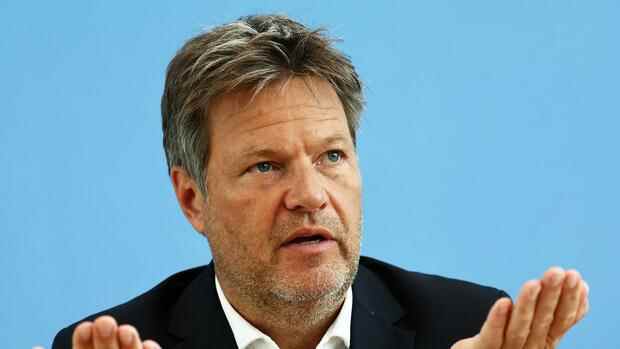The federal government lowered its economic forecast for 2022 from 3.6 percent growth to 2.2 percent this week.
(Photo: IMAGO/Emmanuele Contini)
Berlin The Ukraine war almost drove Germany into a technical recession. Economic output in the first quarter grew by 0.2 percent, as the Federal Statistical Office announced on Friday.
The corona pandemic and persistently disrupted supply chains caused gross domestic product (GDP) to fall by 0.3 percent in the fourth quarter of 2021. A technical recession is spoken of when there are two consecutive quarters of contracting economic output.
The Wiesbaden statisticians explained that the slight growth in the first quarter would have enabled higher investments in particular. Foreign trade, on the other hand, is slowing down growth: “Since the end of February, the economic effects of the war in Ukraine have been having an increasing impact on economic development.”
While January was a comparatively strong month for the German economy, the situation in March in particular weighed on development. It was here that the war in Ukraine had its full impact for the first time. At the end of February, Russian troops marched into Ukraine, which led to considerable uncertainty, especially on the energy markets.
Top jobs of the day
Find the best jobs now and
be notified by email.
The sharply increased prices for gas, oil, coal and electricity are also the main reason for the unfortunate situation of the German economy. Added to this are the sanctions against Russia and disrupted supply chains. In the automotive industry, for example, parts from Ukraine are missing.
Inflation weighs on the economy
The bad start to the year does not bode well for developments over the coming months. The full effects of the war were hardly included in the first quarter, explains Sebastian Dullien, Director of the Institute for Macroeconomics and Business Cycle Research (IMK): “The German economy will only show the full impact of the war in the figures from the second quarter.”
In the final quarter of 2021, economic output fell by 0.3 percent.
(Photo: dpa)
The federal government lowered its economic forecast for 2022 from 3.6 percent growth to 2.2 percent this week. Driven by the high energy prices, she expects an inflation rate of 6.1 percent. Due to the tense geopolitical situation, however, the forecasts are subject to considerable uncertainty, emphasize economic researchers.
Meanwhile, inflation is still increasing compared to the first quarter. According to the first estimate, the inflation rate in Germany in April was 7.4 percent compared to the same month last year. This is the highest level since the fall of 1981. In March, the rate was 7.3 percent.
Inflation weighs not only on consumers but also on foreign trade, which has already been hit by the direct effects of the war. The reason for this is the devaluation of the euro against other currencies.
In March, the prices for goods imported into Germany rose by 31.2 percent compared to the same month last year, as the Federal Statistical Office also announced on Friday. This is the strongest increase since 1974.
More Handelsblatt articles on the war in Ukraine
The devaluation of the euro means that German importers have to buy more expensive and exporters have to sell their goods cheaper. This relationship, the so-called “terms of trade”, is increasingly deteriorating.
Price-adjusted GDP in the first quarter was four percent higher than in the first quarter of 2021, in which the German economy was hit by the effects of the second wave of the corona pandemic. Compared to the level before the corona crisis, economic output is still 0.9 percent lower.
More: Read the current developments in the Ukraine war in the live blog
